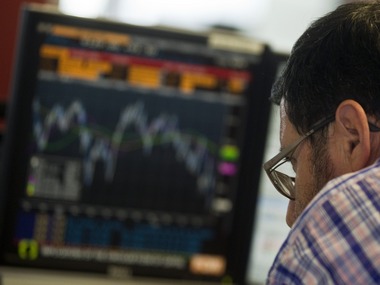New York: US stocks retreated from four-year highs on Monday, joining lower European markets, on fresh worries about eurozone finances and fear that high oil prices could flatten the fragile global economic recovery.
Crude oil fell for the first time in a week, but was not far from last week’s 10-month highs above $125 a barrel in London and 9-month peaks near $110 in New York.
“In the absence of a lot of news you’re seeing profit taking to start the day,” said Rick Meckler, president of investment firm LibertyView Capital Management in New York, which oversees about $2 billion. “It wouldn’t be healthy if there wasn’t some profit taking.”
[caption id=“attachment_227113” align=“alignleft” width=“380” caption=“The flow of money out of stocks and commodities into currencies helped push up the dollar. Reuters”]
 [/caption]
[/caption]
The flow of money out of stocks and commodities into currencies helped push up the dollar. Investors lent support to the greenback after it had fallen against the euro in three previous sessions to near 3-month lows.Central Bank’s planned mid-week injection of cheap three-year loans into the region’s banking system, which was expected to total around half a trillion euros.
The yen, meanwhile, fell to new 9-month lows against the dollar.
“Some retracement is expected, given that dollar/yen has rallied nearly 6.0 percent in the month of February, driven by a combination of factors that include central bank policy and weakened economic data,” said Eric Theoret, currency strategist at Scotiabank in Toronto.
Stocks on Wall Street fell after the Group of 20 leading economies told Europe it must commit more money to fight the EU debt crisis before seeking broader help.
Nearly 90 minutes after the open, the Dow Jones industrial average was down 16.13 points, or 0.12 percent, at 12,966.82. The Standard & Poor’s 500 Index was down 1.78 points, or 0.13 percent, at 1,363.96. The Nasdaq Composite Index was down 4.51 points, or 0.15 percent, at 2,959.24.
Bonds rallied after worries about the impact of high oil prices on economic growth bolstered the safe-haven appeal of US government debt. The benchmark 10-year US Treasury note was up 14/32, with the yield at 1.9273 percent.
With the global economy generally struggling, higher oil costs are seen as the biggest risk to the global rally in equities and commodities.
Oil prices have been on a tear since the start of February on supply concerns related to worsening tensions over Iran’s disputed nuclear programme. Crude gave back some gains after Saudi Arabia increased exports sharply in the past week, and speculation rose that the Obama administration might tap of US strategic oil reserves if prices continued rising.
London’s Brent crude fell 1 percent to around $124.20 a barrel. For the year, it was still up 16 percent. US crude was also off about 1 percent, hovering below $109.
In European equity markets the oil price gains hit the outlook for the automobile sector sending the FTSEurofirst 300 index of top European shares down 0.8 percent to 1,068.50 points, below a seven-month high last week.
Global equities suffered from a weaker session in Asia and Europe, with the MSCI world equity index down 0.7 percent at 329.57.
Year-to-date, it was still up over 10 percent.
The US dollar hit a 9-month high above 81.60 yen, a gain of about 7 percent so far in February, as higher oil prices joined a list of factors weakening the yen, including Japan’s 2011 trade deficit, its first since 1980, Bank of Japan monetary easing and the threat of central bank intervention.
The euro was down 0.4 percent at $1.33906, not far from a 2-1/2 month high of $1.3486 set on Friday, with gains seen possible before the ECB’s second long-term refinancing operation (LTRO) on Wednesday.
But some market players say the impact of the ECB’s operation may already be largely reflected in the prices of assets like European sovereign bonds and even the euro itself.
“It’s all pretty well priced in and pretty well expected. We’re looking for just under 500 billion euros and about 300 billion euros of net new liquidity,” said Kevin Lecocq, chief investment officer, Private Wealth Management, at Deutsche Bank.
“Wednesday won’t be big,” Lecocq forecast.
PTI
)